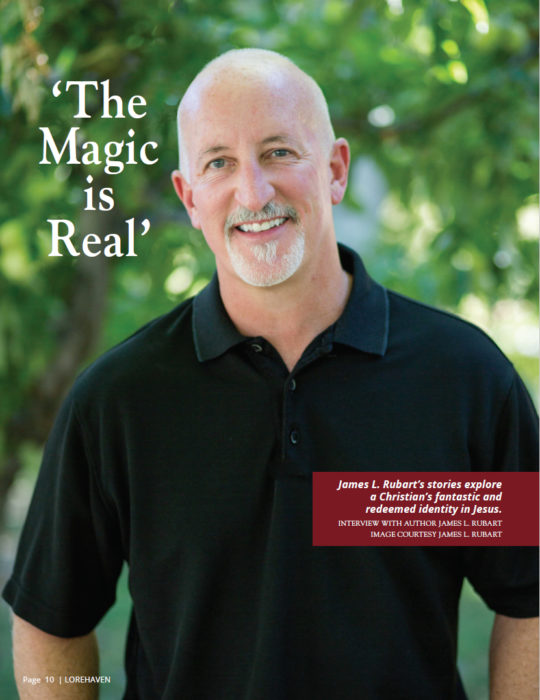‘The Magic Is Real’
Novelist James L. Rubart believes your favorite stories reveal the kind of person you are.
For example, his favorite three films are The Matrix, The Shawshank Redemption, and It’s A Wonderful Life. Each story follows a hero who finds his true identity in a surprising way. Rubart says this theme keeps recurring in his novels, including The Long Journey to Jake Palmer (2016) and his newest release, The Man He Never Was (February 2018).
Rubart says his new story explores a man who will “go into the darkest part of his soul and face that and ultimately find victory over it, in a way that he could never imagine.”
As a child, he found his own identity formed by fantasy stories that reflect biblical truth, including, of course, C. S. Lewis’s The Chronicles of Narnia series.
“I was just taken away to this world,” Rubart says. “At the point in The Voyage of the Dawn Treader where Aslan says, You’re going to have to get to know me in your world by a different name . . . my little tiny eleven-year-old brain thought, ‘Is he talking about Jesus? Is he Jesus? That’s the coolest thing in the world.’
“That was the moment when I thought: someday I’ve got to try to do for others what Lewis did for me,” he says. “I was captured by the idea of story.”
Rubart says he didn’t originally intend to write fantasy genre fiction. In fact, rather than story-telling about humans drawn from reality into fantasy worlds, he prefers crafting fictional heroes who experience God’s miraculous twists in their realities.
“I’ve had some experiences where I realize the magic is real,” Rubart says. “And by that I mean: we read all these supernatural, fantastical things happening in the Bible.”
“The magic is real . . . all these supernatural, fantastical things happening in the Bible.”
— James L. Rubart
Christians may believe these stories are true, but don’t imagine how they affect our real lives. Rubart asks: if these stories really happened—if God has supernaturally authored a gospel of miracles in human history—how should we see ourselves and our world?
“I’m fascinated by the idea that we are absolutely spiritual beings having a human experience, and not the other way around,” Rubart says.
Biblical teaching often inspires Rubart’s novels, such as a sermon by the Rev. Tim Keller about Romans 7. In that chapter, the apostle Paul explores how Christians have “died” to sin but still struggle to follow our new, spiritually alive nature in Jesus.
Rubart says he realized Robert Louis Stevenson’s classic novella The Strange Case of Dr Jekyll and Mr Hyde also explores Romans 7. But because Stevenson seems to let the dark side win, Rubart says, his new novel adapts the tale with a modern and more redemptive theme—one he believes reflects the biblical truth of the Christian’s new nature.
“We have this trope or this story that we use in the church . . . that there’s a white dog and a dark dog, and whichever you feed more is going to win,” he says. “That story is not true if you’re a Christian. . . . We have been crucified with Christ [Galatians 2:20].”
So instead of lamenting our struggle, Rubart says, we are called to read our own “label”—saved, made new by Jesus—and join our Savior on the adventures he sends us.
Rubart says he’s planning several new fantasy adventures of his own.
Along with helping start the Rubart Writing Academy for aspiring authors, he’s trying stories with more overtly fantastical themes. For example, fans can watch for a new series of time-travel novellas and audiobooks from Rubart and two coauthors. That series will star Rembrandt Stone, a detective recruited to solve cold cases in history.
But although we need history and nonfiction truths for our minds, Rubart says, it’s stories and imagination that stick in our memories and excite our hearts.
“As people who follow Christ, he’s probably a pretty good model to follow. And that’s the way he taught: with fiction.”
— James L. Rubart
“We do not remember three-point sermons, as wonderful as they might be; we remember stories,” Rubart says. “As people who follow Christ, he’s probably a pretty good model to follow. And that’s the way he taught: with fiction.”
We may also find that fiction lasts as long as Christ’s people live, he says.
“We’re going to have this wedding feast, right?” Rubart says, referring to Jesus’s future marriage supper referred to in Revelation 19:6–9. “Are there going to be any stories told around the wedding feast? Well, somebody’s got to write those stories.”





























Share your fantastical thoughts.